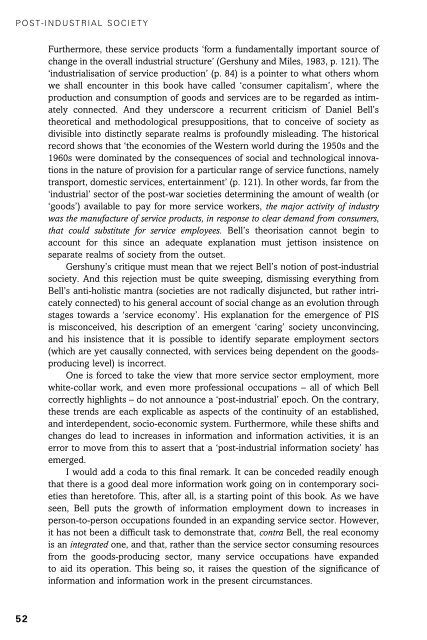Theories of the Information Society, Third Edition - Cryptome
Theories of the Information Society, Third Edition - Cryptome
Theories of the Information Society, Third Edition - Cryptome
Create successful ePaper yourself
Turn your PDF publications into a flip-book with our unique Google optimized e-Paper software.
POST-INDUSTRIAL SOCIETY<br />
Fur<strong>the</strong>rmore, <strong>the</strong>se service products ‘form a fundamentally important source <strong>of</strong><br />
change in <strong>the</strong> overall industrial structure’ (Gershuny and Miles, 1983, p. 121). The<br />
‘industrialisation <strong>of</strong> service production’ (p. 84) is a pointer to what o<strong>the</strong>rs whom<br />
we shall encounter in this book have called ‘consumer capitalism’, where <strong>the</strong><br />
production and consumption <strong>of</strong> goods and services are to be regarded as intimately<br />
connected. And <strong>the</strong>y underscore a recurrent criticism <strong>of</strong> Daniel Bell’s<br />
<strong>the</strong>oretical and methodological presuppositions, that to conceive <strong>of</strong> society as<br />
divisible into distinctly separate realms is pr<strong>of</strong>oundly misleading. The historical<br />
record shows that ‘<strong>the</strong> economies <strong>of</strong> <strong>the</strong> Western world during <strong>the</strong> 1950s and <strong>the</strong><br />
1960s were dominated by <strong>the</strong> consequences <strong>of</strong> social and technological innovations<br />
in <strong>the</strong> nature <strong>of</strong> provision for a particular range <strong>of</strong> service functions, namely<br />
transport, domestic services, entertainment’ (p. 121). In o<strong>the</strong>r words, far from <strong>the</strong><br />
‘industrial’ sector <strong>of</strong> <strong>the</strong> post-war societies determining <strong>the</strong> amount <strong>of</strong> wealth (or<br />
‘goods’) available to pay for more service workers, <strong>the</strong> major activity <strong>of</strong> industry<br />
was <strong>the</strong> manufacture <strong>of</strong> service products, in response to clear demand from consumers,<br />
that could substitute for service employees. Bell’s <strong>the</strong>orisation cannot begin to<br />
account for this since an adequate explanation must jettison insistence on<br />
separate realms <strong>of</strong> society from <strong>the</strong> outset.<br />
Gershuny’s critique must mean that we reject Bell’s notion <strong>of</strong> post-industrial<br />
society. And this rejection must be quite sweeping, dismissing everything from<br />
Bell’s anti-holistic mantra (societies are not radically disjuncted, but ra<strong>the</strong>r intricately<br />
connected) to his general account <strong>of</strong> social change as an evolution through<br />
stages towards a ‘service economy’. His explanation for <strong>the</strong> emergence <strong>of</strong> PIS<br />
is misconceived, his description <strong>of</strong> an emergent ‘caring’ society unconvincing,<br />
and his insistence that it is possible to identify separate employment sectors<br />
(which are yet causally connected, with services being dependent on <strong>the</strong> goodsproducing<br />
level) is incorrect.<br />
One is forced to take <strong>the</strong> view that more service sector employment, more<br />
white-collar work, and even more pr<strong>of</strong>essional occupations – all <strong>of</strong> which Bell<br />
correctly highlights – do not announce a ‘post-industrial’ epoch. On <strong>the</strong> contrary,<br />
<strong>the</strong>se trends are each explicable as aspects <strong>of</strong> <strong>the</strong> continuity <strong>of</strong> an established,<br />
and interdependent, socio-economic system. Fur<strong>the</strong>rmore, while <strong>the</strong>se shifts and<br />
changes do lead to increases in information and information activities, it is an<br />
error to move from this to assert that a ‘post-industrial information society’ has<br />
emerged.<br />
I would add a coda to this final remark. It can be conceded readily enough<br />
that <strong>the</strong>re is a good deal more information work going on in contemporary societies<br />
than heret<strong>of</strong>ore. This, after all, is a starting point <strong>of</strong> this book. As we have<br />
seen, Bell puts <strong>the</strong> growth <strong>of</strong> information employment down to increases in<br />
person-to-person occupations founded in an expanding service sector. However,<br />
it has not been a difficult task to demonstrate that, contra Bell, <strong>the</strong> real economy<br />
is an integrated one, and that, ra<strong>the</strong>r than <strong>the</strong> service sector consuming resources<br />
from <strong>the</strong> goods-producing sector, many service occupations have expanded<br />
to aid its operation. This being so, it raises <strong>the</strong> question <strong>of</strong> <strong>the</strong> significance <strong>of</strong><br />
information and information work in <strong>the</strong> present circumstances.<br />
52
















